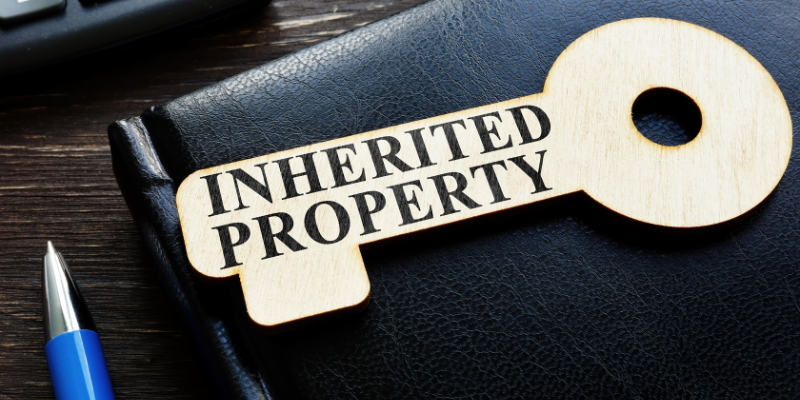Inheriting a property often comes with mixed emotions and practical challenges. You may be facing unexpected renovation costs, tax implications, or complex probate proceedings when there’s no will in place. Yet these inherited properties also represent valuable opportunities for investors and homebuyers seeking properties with potential at competitive prices. If you’ve recently inherited a property and are considering selling, you likely have questions about the unique steps involved in this situation. This comprehensive guide will walk you through selling an inherited property effectively, helping you maximize potential returns while minimizing stress throughout the process.
How To Sell An Inherited Property in Florida
The inheritance process can feel overwhelming when you’re uncertain about what comes next. Most states require inherited properties to go through probate—a legal procedure where the Court formally transfers ownership of estate assets to beneficiaries and heirs. This timeline varies significantly depending on whether a clear will exists. A detailed, properly executed will typically streamlines the process, while contested or non-existent wills often extend legal proceedings considerably.

Determine the Executor
If there’s a valid will, step one is confirming who the will names to handle the estate that person is often called the executor (or personal representative in many states). The court must first accept the will and formally appoint that person before any assets are sold or transferred. Once appointed, the representative has legal authority to gather information about the estate, pay valid debts, and carry out the will’s instructions.
Things can slow down if the will is missing, unclear, or challenged. In those cases, the court will play a larger role in directing the process and resolving disputes. When there’s no will at all, the court appoints an administrator to do essentially the same job protect the estate, settle what’s owed, and distribute what’s left to the rightful heirs. That appointed representative may also recommend selling property if it’s needed to cover mortgages, taxes, or other obligations.

Working with Lawyers and Real Estate Agents
Probate has rules and deadlines that are easy to miss, so a knowledgeable probate attorney is worth their weight in calm. They’ll confirm authority to sell, prepare required filings, and keep the timeline moving.
After your attorney green-lights a sale, bring in a real estate agent who regularly handles inherited homes. These agents understand what title companies, buyers, and the court will expect. They’ll advise which updates are worth doing (and which are a waste), help you set the right price for the home’s current condition, and attract qualified buyers who can actually close. The result: fewer surprises, cleaner negotiations, and a smoother path to the finish line.

Resolve Any Debts
Inheritances aren’t always “money falling from the sky.” Homes can carry mortgages, tax balances, HOA/condo dues, contractor liens, or even utility arrears. By law, the estate usually must pay valid debts first before heirs receive proceeds. That’s why it’s smart to:
- Order a title search early to reveal mortgages and liens.
- Get accurate payoff statements for loans, taxes, and HOA/condo fees.
- Track carrying costs (insurance, lawn, utilities) so you can factor them into timing decisions.
An experienced attorney or estate advisor can help you weigh options sell as-is for speed, invest in light updates for a higher price, or consider other strategies that fit the estate’s cash position and your timeline.

Clean & Restore the Home
Once authority is in place, decide whether you’ll move in, rent, or sell. Many inherited homes need some love anything from a deep clean and minor fixes to more significant repairs. Before you swing a hammer, build a simple plan around net outcome, not just list price:
- Basic refresh (fastest): Declutter, deep clean, handle safety items, improve lighting and curb appeal. Ideal when time and budget are tight.
- Targeted repairs (balanced): Address high-impact issues (roof leaks, HVAC problems, obvious wood rot) that could scare away buyers or stall financing.
- Full update (slowest): Only if the numbers make sense. Price out materials, labor, and time then compare to selling as-is.
A probate-savvy agent can show you both scenarios as-is vs. lightly improved—so you can choose the path that delivers the best net after costs, time, and risk.
Contact Us today for your cash offer!
Contact us today to receive a competitive cash offer for your inherited house, condo, or property. We purchase homes in any condition, and we can guide you through the often complicated process of selling a house in probate!
Get An Offer Today, Sell In A Matter Of Days…
Do all heirs have to agree to sell the property?
When dealing with inherited property, ownership rights determine who must consent to a sale. If a will or probate court has already established clear ownership, individual heirs can sell their portion without requiring agreement from other heirs. However, in situations where ownership remains undetermined—such as estates without wills or those with court-appointed administrators—all heirs must consent to the sale. This requirement also applies to properties auctioned by courts to settle estate debts. Potential buyers should understand that if even one heir contests an auction sale, the transaction will be halted until all parties reach a resolution.
How to Settle a Disagreement
When resolving inheritance disputes between heirs, several options exist, but establishing an executor is essential from the beginning. This designated individual ensures your loved one’s final wishes are honored according to the will, preventing conflicts over asset distribution. Without an executor in place, or when facing will contestation, consider engaging a professional mediator. This neutral third party can effectively help family members work through their differences, providing a considerably more cost-effective solution than pursuing lengthy and expensive litigation through probate court.
Best Practices
But what if the conflict involves the executor themselves? Disputes often arise when a family member is appointed as executor or trustee, creating tension with other family members. In such situations, the appointed person might consider declining the appointment in favor of an independent fiduciary, such as an estate-planning attorney, to administer the will. Stepping aside while a neutral party takes charge might not only prevent arguments from developing but also provide everyone the necessary time and space to process difficult emotions before permanent damage occurs to family relationships.
How is inherited property taxed when sold?
State and local governments across the United States collected over $5.3 billion in revenue from estate and inheritance taxes in 2020. That’s substantial! However, with laws and regulations varying significantly from state to state, it’s crucial to conduct thorough research and consult with an attorney knowledgeable in tax law and estate planning as you navigate an unexpected inheritance or prepare your own will.
State Tax Laws
Each state maintains different regulations regarding inheritances. When selling an inherited property, states may impose an estate tax, an inheritance tax, as well as a capital gains tax on your inheritance. Currently, twelve states have implemented an estate tax, 5 have an inheritance tax, and one state imposes both an estate and inheritance tax.

Capital Gains Tax on Inherited Property
Understanding capital gains tax and which states impose it is essential when inheriting property. This tax applies to profit made on inherited assets, but importantly, it’s only triggered when you sell the asset for a gain—not at the time of inheritance. The tax is calculated on the difference between the property’s selling price and its original purchase price. While most states require capital gains tax on inherited properties, various exemptions may apply. For instance, Washington State doesn’t impose this tax on homes or properties selling for less than $250,000. Several legal strategies exist to minimize or defer your capital gains tax liability, such as reinvesting proceeds into another property through a 1031 exchange. Before listing your inherited property, we strongly recommend consulting with a tax professional familiar with your state’s specific regulations to ensure the most favorable financial outcome.

Estate Taxes
An estate tax is paid directly from the estate to the state before any inheritance distribution occurs. Concerned about a significant reduction from the estate? Rest assured! The estate tax has a substantial minimum threshold which in 2023 was $12.92 million for individuals. This means the government cannot impose an estate tax unless your total taxable estate exceeds $12,920,000. The remainder passes to heirs estate tax-free. Despite this high threshold, each year more states repeal their estate tax laws, foregoing millions in potential revenue.

Inheritance Taxes
Only six states currently maintain an inheritance tax, meaning you’re likely among the fortunate majority who won’t face this obligation. However, if you reside in Maryland, Nebraska, Kentucky, New Jersey, Pennsylvania, or Iowa, you as a beneficiary/heir will be required to pay taxes on inherited assets and properties. The good news is that even if you live in a state with an inheritance tax, you won’t owe anything if the deceased lived in one of the 44 states without this tax requirement.
Documents required to sell an inherited property
To establish legal ownership and list a property for sale, you’ll need copies of court-issued documents that grant you legal authority as the executor or administrator of the estate. These documents confirm your right to manage the inherited property. Once you’ve secured a buyer and are preparing to close, you’ll need the deed, title insurance, or other relevant legal records to verify legal ownership of the inherited property.
Thoroughly research what additional documentation may be required when selling an inherited property. Some jurisdictions require supplementary property-related documents, including previous surveys, inspection reports, or other relevant paperwork concerning the property’s condition or history.
Is there an easier way to sell?
Absolutely! Panhandle Real Estate Investments is a direct home buying company with an established reputation for purchasing inherited houses for cash with minimal stress and reduced fees. Contact us today for a competitive cash offer on your inherited house, condo, or property. We purchase homes in any condition and can guide you through the complex process of selling a house in probate! Let us transform your home selling experience into something straightforward and stress-free so you can move forward with your life.
Even if the property sustained significant storm damage or has been neglected for years requiring substantial upgrades to make it “market ready,” once you accept our fair cash offer, our team of experts will handle all those costly repairs so you don’t have to! We’ve simplified the process of selling an inherited house.
Do You Actually Need Full Probate?
You may not need formal probate in a few situations:
- Disposition Without Administration (very limited): If the estate has only exempt personal property and/or very small amounts needed to reimburse last-illness and funeral expenses (generally up to $6,000), the court can release funds without opening an estate. Real estate usually doesn’t qualify.
- Summary Administration (streamlined): Available if the probate assets are $75,000 or less (excluding exempt homestead) or the decedent has been deceased more than 2 years. No personal representative is appointed in most cases.
- Formal Administration: Required when assets exceed the summary threshold, when creditor issues/complexity exist, or when a personal representative is needed.
Not sure which lane you’re in? We’ll help you inventory assets (what’s probate vs. non-probate), check titling/beneficiaries, and point you to the right track with an estimated timeline.
Homestead: Powerful Protections & Tricky Rules
- Descent/Devise Limits: Florida homestead can’t be freely left by will if the owner is survived by a spouse or minor child; in many cases the spouse takes a life estate and descendants receive remainder. This affects who must sign and how you can sell.
- Save Our Homes Cap Resets: When ownership changes, the assessed value cap generally resets to just value the following January 1 meaning property taxes may jump for the next owner. This can influence pricing/net proceeds.
- Applying for Exemptions: Heirs who move in and make the property a primary residence must apply for homestead exemption; it’s not automatic and is subject to county deadlines.
We’ll map out who has signing authority, whether to petition the court for homestead determination, and how to message tax changes to buyers to keep closings smooth.
Contact Us today for your cash offer!
If you own a property currently in probate that you’re ready to sell, call us at (850) 778-2212 anytime to receive a competitive cash offer for that inherited home. We purchase properties regardless of condition and no matter what financial complications the estate might be facing.

